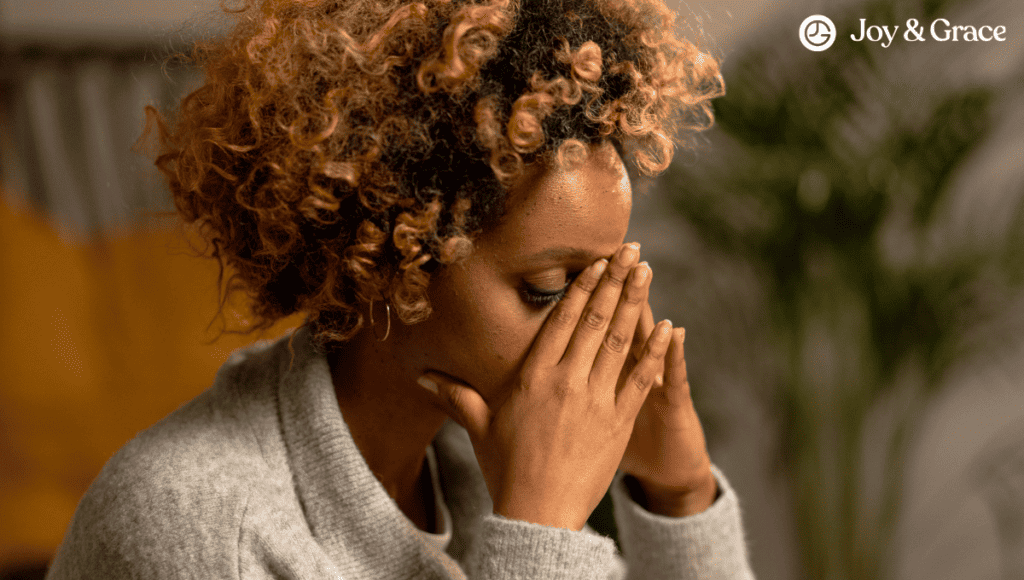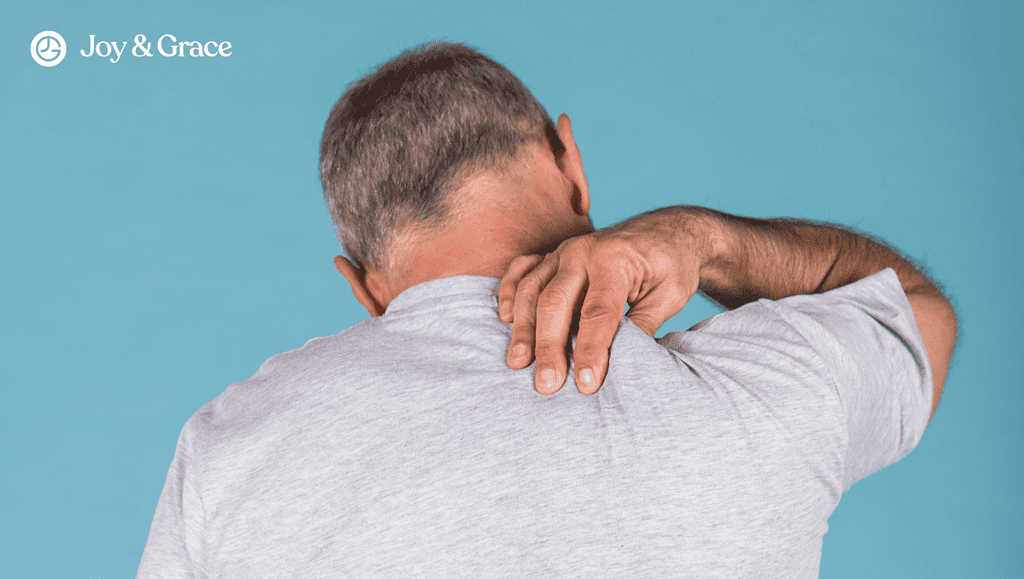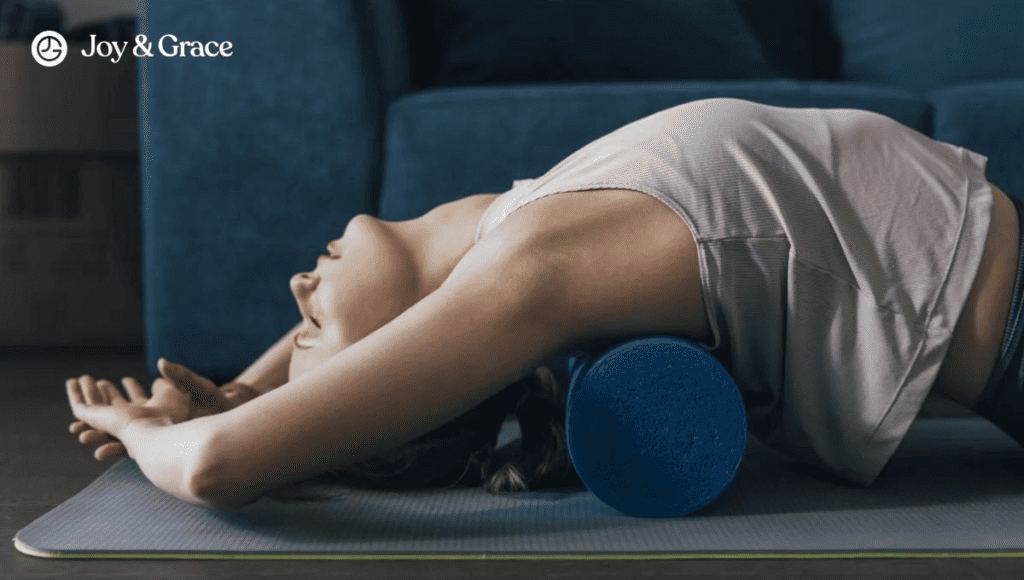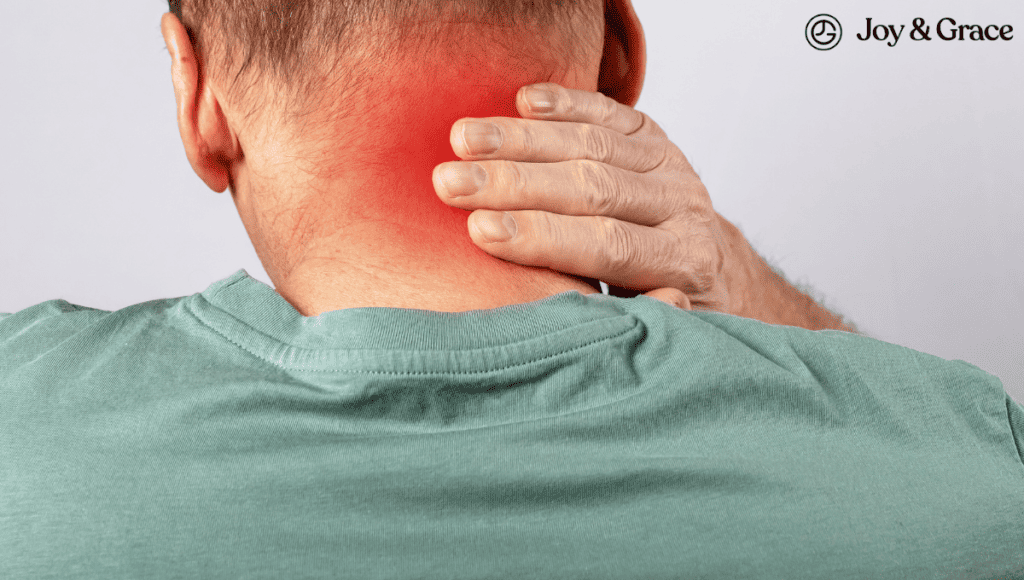You’ve probably woken up before with neck pain and stiff shoulders. You may immediately wonder if you’ve slept wrong. Or perhaps your desk and chair setup isn't quite right. But have you ever considered that mental changes could be causing your physical discomfort?
Mental health is often overlooked when talking about pain. Yet, the bridge between the two is a two-way traffic. Mental changes like depression and anxiety can be associated with not just distress but also neck pain. We will explore the connection between mental wellness and persistent neck pain.
Can Depression and Anxiety Cause Neck Pain?
Yes, depression and anxiety often go hand-in-hand with neck pain. They’re important risk factors for neck pain and are strongly linked to higher levels of neck pain.
The relationship between pain, depression, and anxiety is not entirely understood. However, it seems to be both psychological and biological. In this sense, depression-anxiety neck pain is thought to arise due to:
- Constant low mood or worry. These symptoms are characteristic of depression and anxiety disorders. Worry, anger, and frustration may lead to a fight-or-flight stress response. Fight-or-flight is the way the body reacts when perceiving a dangerous or alarming situation. This stress response increases muscle tension, which may cause neck pain.
A constant low mood may also give rise to feelings of worthlessness and carelessness. These feelings may cause tiredness, poor posture, and other unhealthy habits. The combined effect of these changes can result in neck pain.
- Changes in the brain's pain-processing pathways. Depression and anxiety can affect the way we feel pain. The same brain structures that control emotions have been found to also regulate pain signals. Thus, a change in how we process emotions in the brain may also change how we perceive pain levels. The chemical messengers are the same too, and they play huge roles in pain processing, depression, and anxiety. These include serotonin and norepinephrine.
These findings show the relationship between neck pain and emotional disorders is almost undeniable.
The tricky part about anxiety- and depression-triggered neck pain is that it creates a vicious cycle. Neck pain (especially if it’s chronic pain) can be depressing and can intensify anxiety. Over time, this loop can worsen both the physical symptoms and the emotional distress.
Can Anxiety Cause Chronic Neck Pain?
Yes, anxiety can indeed cause chronic neck pain. Anxiety is not only a recognized risk factor for new-onset neck pain but also increases the odds of neck pain becoming chronic.
Chronic neck pain is neck pain that persists for more than three months. It’s a common problem worldwide, and it often leads to disability.
Anxiety itself is a feeling of uneasiness, worry, or fear. It’s the feeling you might get before making a big public speech or decision. Anxiety can be mild or severe and affects about one-third of US adults. Anxiety disorders, on the other hand, are conditions with anxiety as their main symptom. They’re grouped as follows:
- Generalized anxiety disorder (GAD)
GAD is a long-term condition characterized by daily anxiety. The anxiety in GAD may be related to various things or situations.
- Panic disorder
Panic disorders are characterized by anxiety, stress, and panic attacks. People with panic disorder live in constant fear. Panic attacks are marked by physical and mental symptoms. They often occur for no apparent reason.
- Phobias
Phobias are irrational fears of objects or situations. They range from common, such as claustrophobia (fear of tight spaces), to weirdly specific, such as omphalophobia (fear of belly buttons).
- Post-traumatic stress disorder (PTSD)
PTSD is a condition that appears as a consequence of a traumatic event. Such trauma may include a stressful, scary, or dangerous situation experienced before.
- Social anxiety disorder
This disorder is a long-term fear of social interactions.
- Illness anxiety disorder (Hypochondria)
Hypochondria is a condition in which you are constantly anxious about being sick. You might be healthy otherwise, but you’re always worried you’re not.
A systematic review conducted on 2022 found GAD and PTSD to be the most common anxiety disorders that occur with neck pain.
While there's evidence of a connection, not all experts agree that anxiety and chronic neck pain always go hand-in-hand. For instance, a 2010 study argues that socially functional people can learn to cope with neck pain over the long term. It also suggests that anxiety is sometimes reported because of a lack of a better word to describe feelings of anger and sadness.
Although individual experiences vary, the common belief remains that feeling unwell definitely tends to worsen neck pain and not improve it.
How Does Depression Worsen Neck Pain?
The link between depression and neck pain goes both ways. Thus, depression may lead to neck pain, and neck pain may cause depressive symptoms.
Depression is a mood disorder marked by long-lasting feelings of hopelessness and unhappiness. Some of the symptoms of depression are:
- Constant fatigue
- Random pains and aches (such as neck pain)
- Loss of interest in the activities you used to love
- Low sex drive
- Low appetite
- Sleeplessness
- Suicidal thoughts
When you’re depressed, you’re tired, and your sleep quality falls off a cliff. As a result, your neck muscles may become tense, and your posture may suffer as well. Consequently, neck and shoulder pain may appear. This is kind of similar to the vicious cycle of anxiety, as we mentioned earlier.
Depression can also interfere with the brain’s ability for pain perception. One manifestation of this effect is the experience of progressively worsening physical pain (hyperalgesia). For people who experience hyperalgesia, a minor bump or scratch might feel intensely painful. Similarly, a slight strain in the neck could be perceived as a sharp, debilitating pain.
Depression is much more than just feeling down for a while. It’s a serious issue that takes effort and treatment to overcome. Addressing neck pain and depressive symptoms early is the first and probably most important step to recovery.
Can Depression Also Cause Shoulder Pain?
Yes. According to a 2013 study, depression, anxiety, and poor sleep quality can occur with shoulder pain. The mechanisms that cause neck pain in patients with depression and anxiety apply to shoulder pain, too.
Chronic Neck Pain and Anxiety-Depression: Prevalence and Associated Risk Factors
Neck pain is one of the most common musculoskeletal complaints worldwide. About two-thirds of adults worldwide report suffering from neck pain at least once during their lifetimes. 5–10% of all neck problems persist and become chronic, thus adding to the burden.
As mentioned, depression and anxiety are prevalent in chronic neck pain patients. A comprehensive 2023 study tells us that more than 68% of patients with neck pain also suffer from anxiety.
The study goes on to estimate that more than 55% of them also have depression. These high percentages serve as proof of the evident connection between neck pain, anxiety, and depression. Similar numbers were also found in cases of chronic neck pain.
Some studies have reported differences in these relationships based on education level, age, sex, and marital status. Others have shown that these differences are nonexistent. Generally, women tend to suffer from anxiety symptoms more often than men. Moreover, chronic neck pain is more likely to occur as we age.
Other mental health-related psychosocial factors for neck pain include:
- Pain catastrophizing (overthinking and exaggerating pain)
- Stress and distress
- Lack of sleep or low sleep quality
- Excessive alcohol consumption
- Lack of social support or loneliness
Can Treating Anxiety and Depression Improve Neck Pain?

Yes, treating anxiety and depression may indeed relieve neck pain. In 60% of cases, depression may occur along with anxiety. Hence, treatment for both of these mental conditions might be necessary.
To treat depression and anxiety associated with neck pain, you may need a combination of:
- Psychotherapy,
- Medications, and
- Lifestyle changes.
Psychotherapy For Neck Pain Induced By Anxiety And Depression
One of the best psychotherapy approaches to depression and anxiety is cognitive behavioral therapy (CBD). CBD is also one of the best-studied psychotherapies for neck pain. It’s based on the idea that feelings, thoughts, and sensations are related.
CBD teaches you to learn how to manage your pain and not feel like a victim. The goal of CBD is to take your mind off the pain by focusing on activities that improve it. For example:
- You may learn to face your deepest fears instead of avoiding them.
- You may role-play and think about how you can deal with situations that may happen in real life.
- You may also learn how to relax your mind and body.
By practicing these psychological strategies and techniques, you can actively work with your therapist to gain control over your pain and improve your ability to cope.
Medications
What about medicines? Well, there’s a wide range of them that can be used for neck pain, depression, and anxiety. Here are the most effective and adequate ones:
- Non-steroidal anti-inflammatory drugs (NSAIDs)
They are popular painkillers that work against neck pain. NSAIDs may have side effects and interactions you should be aware of beforehand. Always consult your healthcare provider before taking them.
- Acetaminophen
Acetaminophen is commonly known as Tylenol. It’s another painkiller with fewer side effects, but it may interact with other drugs.
- Opioid medications
These medicines may be prescribed for neck pain relief if the painkillers above don’t work. Apart from interacting with other drugs, opioids may be addictive. Always follow your doctor’s advice about how to use them.
- Psychiatric medications
These medicines traditionally treat depression and anxiety but may also have anti-pain effects. They include the following:
Lifestyle Changes - What Self-Care Can Help Anxiety-Related Neck Pain?
As mentioned, you must also make lifestyle changes for the best results against neck pain. Here’s what you can do to care for your anxiety- and depression-related neck pain:
- Incorporate relaxation techniques
Relaxation techniques are crucial for soothing anxiety-induced neck pain. Deep breathing, progressive muscle relaxation, yoga, and mindfulness meditation are all effective tools.
Let’s use progressive muscle relaxation as an example of a relaxation technique. It’s performed in two steps:
- First, tense your muscles. You may target the neck and shoulder muscles first. Take a deep breath and raise your shoulders to your ears. Hold this position for five seconds. Try to focus on your neck and shoulder muscles becoming tense.
- Second, relax your muscles. Release your breath and bring your shoulder back down. Feel your neck and shoulders turn completely limp and loose. Focus on the feeling and hold it for fifteen seconds.
You may continue the same tension-relaxation routine with other muscle groups in the body. The best way to go about it is to start with the feet and work your way up. After 10-15 minutes, you’ll find yourself feeling deeply relaxed.
- Exercise regularly
Exercise can help elevate your mood levels and fight anxiety and depression. It’s also a great way to feel better about yourself!
- Focus on your sleep quality
Maintaining good sleep hygiene is crucial. Help yourself by:
- Keeping a regular sleep scheduleTry to sleep and wake up at the same time each day. Don’t get distracted, though! Always give your mind and body at least 7-8 hours of sleep during the night.
- Creating a restful environmentEnsure your room is dark and quiet during the night. Pay attention to your pillows and sheets, too! They must fit your preferences and needs.
- Avoiding caffeine and large meals before bedtimeCoffee and food before bedtime are no-gos. Have dinner at least 2-3 hours before bed, and keep it light afterward with some tea, honey, or fruit.
- Keeping a regular sleep scheduleTry to sleep and wake up at the same time each day. Don’t get distracted, though! Always give your mind and body at least 7-8 hours of sleep during the night.
- Understand the mind-body connection
Understanding how your mental health impacts your physical health is vital. The more you understand the mind-body connection, the better you can manage your symptoms.
- Maintain a healthy diet
Eating a healthy diet that supports your mental health is also essential. Avoid alcohol and foods and drinks high in caffeine and sugar. Instead, opt for whole grains, fruits, and vegetables. Drink plenty of water daily to refresh your body and mind.
- Do more of what you enjoy
Engaging in activities you truly enjoy can do wonders for your anxiety and depression symptoms. Any activity you like, whether it’s painting, reading, or meeting friends, can release endorphins. Endorphins are the body's natural painkillers and mood elevators. Physical activities like walking or running can help, too.
Remember: each person is unique. Thus, what works for one might not work for another. Take the time to discover what self-care strategy works best for you.
When Should I Seek Professional Help for Anxiety-Related Neck Pain?
If you're suffering from persistent pain that does not respond to the lifestyle changes we mentioned, it could be time to reach out to a doctor.
Do consult a doctor if you also notice anxiety or depression symptoms. Anxiety and depression should never be ignored. The earlier you address your complaints, the quicker your recovery will be.
Is There a Link Between Neck Pain and Suicidal Thoughts?

Yes, suicidal thoughts may be a byproduct of neck pain. A 2023 study shows chronic neck and back pain is associated with 2.5 times increased odds of suicide attempts. Associated depression and anxiety increase the risk even further.
If you’re dealing with suicidal thoughts, call or text 988. Reaching out because you’re feeling overwhelmed is not a sign of weakness. Remember that you’re not alone and that help is always available.
Takeaway
Depression and anxiety are important risk factors for neck pain. They’re significantly associated with increasing neck pain levels.
The relationship between pain, depression, and anxiety is psychological and biological.
Chronic neck pain is neck pain that persists for more than three months. It’s a common problem worldwide, and it often leads to disability. Chronic neck pain can also result in anxiety and depressive disorders.
Anxiety is not only a recognized risk factor for neck pain but also increases the odds of neck pain becoming chronic.
GAD and PTSD are the most common anxiety disorders that can occur with neck pain.
The link between depression and neck pain goes both ways. Thus, depression may lead to neck pain, and neck pain may cause depressive symptoms.
Depression can interfere with how the brain processes pain. This effect may present as increasingly severe pain (hyperalgesia).
More than 68% of patients with neck pain suffer from anxiety. More than 55% of them have depression.
Treating anxiety and depression may relieve neck pain. To treat depression and anxiety associated with neck pain, you may need a combination of:
- Psychotherapy,
- Medications, and
- Lifestyle changes.
Cognitive behavioral therapy (CBD) is an effective psychotherapy method for anxiety and depression. CBD is also one of the best-studied psychotherapies for neck pain.
The most effective medications for neck pain, anxiety, and depression include the following:
- Non-steroidal anti-inflammatory drugs (NSAIDs)
- Acetaminophen
- Opioid medications
- Psychiatric medications (antidepressants and mood stabilizers)
If neck pain persists despite treatment, consult your health care provider.
Anxiety and depression should never be ignored. The earlier you address your complaints, the quicker your recovery will be.















